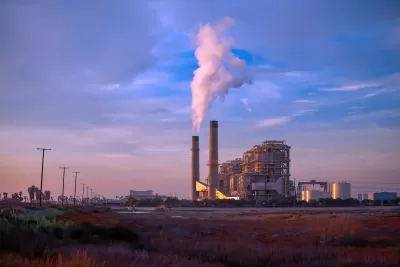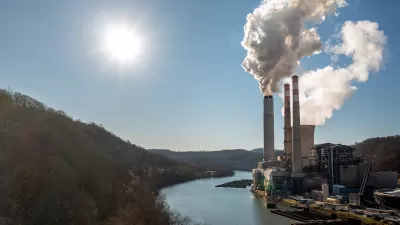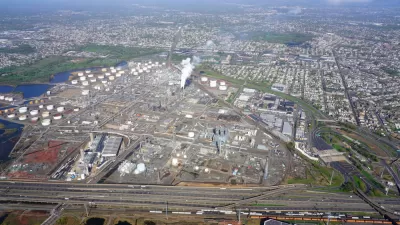New rules from the US Environmental Protection Agency to regulate greenhouse gas emissions from fossil fuel-fired power plants survived an attempt by 25 Republican-led states to block their implementation while their case is litigated.

“A federal appeals court on Friday unanimously denied a lawsuit from a coalition of Republican attorneys general and the fossil fuel industry seeking to block the Environmental Protection Agency’s (EPA) pollution standards for power plants,” wrote Zack Budryk, energy and environment reporter for The Hill on July 19.
As noted in an earlier post on May 14, 25 Republican-led states waited for EPA's “Greenhouse Gas Standards and Guidelines for Fossil Fuel-Fired Power Plants," which includes the “New Source Performance Standards for Greenhouse Gas Emissions from New, Modified, and Reconstructed Fossil Fuel-Fired Electric Generating Units,” to be published in the Federal Register before filing suit to stay the new rules.
The May 9 press release from the Georgia attorney general's office claimed that the “rule also disregards a prior opinion from the U.S. Supreme Court in West Virginia v. EPA, which warned that the EPA should not use a narrow regulatory provision to force coal-fired power plants into retirement.”
“In its [three-page] ruling [pdf], the [three-judge] panel disagreed, writing that ‘petitioners have not shown they are likely to succeed on [their] claims given the record in this case,’” adds Budryk of The Hill.
Nor does this case implicate a major question under West Virginia v. EPA … because EPA has claimed only the power to "set emissions limits under Section 111 [of the Clean Air Act] based on the application of measures that would reduce pollution by causing the regulated source to operate more cleanly[,]" a type of conduct that falls well within EPA’s bailiwick.
“The court will now begin considering the case on the merits,” notes the Environmental Defense Fund, which had filed an amicus brief [pdf] on June 11 in support of the EPA, at the end of its July 19th press release.
We will continue to strongly defend EPA’s cost-effective and achievable carbon pollution standards for power plants.
Musical chairs for power plant emissions rules?
The power plant emissions rule dates back to the Obama administration [Planetizen: EPA Releases Carbon-Cutting Rule for Existing Power Plants, June 3, 2014], when it was known as the Clean Power Plan rule, which was nullified by the aforementioned landmark Supreme Court ruling, West Virginia vs. EPA. [Docket #20-1530] on June 30, 2022. The new EPA rules officially repeal the Trump administration's Affordable Clean Energy rule.
Should the former president return to office next year, the second Trump administration's EPA will likely redo the rules which have deadlines for compliance of 2030 or 2032.
However, the next stop for the rules may be the Supreme Court.
“We plan to seek a stay from the U.S. Supreme Court as soon as possible,” West Virginia Attorney General Patrick Morrissey’s (R) office told The Hill.
Additional reading on the appeals court ruling can be found in the Associated Press article by their climate, environment & energy policy reporter, Matthew Daly. Daly also describes the carbon capture aspects of the new rules which also apply natural gas power plants, as does the earlier Planetizen post on the new rules.

Study: Maui’s Plan to Convert Vacation Rentals to Long-Term Housing Could Cause Nearly $1 Billion Economic Loss
The plan would reduce visitor accommodation by 25,% resulting in 1,900 jobs lost.

North Texas Transit Leaders Tout Benefits of TOD for Growing Region
At a summit focused on transit-oriented development, policymakers discussed how North Texas’ expanded light rail system can serve as a tool for economic growth.

Using Old Oil and Gas Wells for Green Energy Storage
Penn State researchers have found that repurposing abandoned oil and gas wells for geothermal-assisted compressed-air energy storage can boost efficiency, reduce environmental risks, and support clean energy and job transitions.

Private Donations Propel Early Restoration of Palisades Playground
Los Angeles has secured over $1.3 million in private funding to restore the Pacific Palisades playground months ahead of schedule, creating a modern, accessible space that supports community healing after recent wildfires.

From Blight to Benefit: Early Results From California’s Equitable Cleanup Program
The Equitable Community Revitalization Grant (ECRG) program is reshaping brownfield redevelopment by prioritizing projects in low-income and environmental justice communities, emphasizing equity, transparency, and community benefits.

Planting Relief: Tackling Las Vegas Heat One Tree at a Time
Nevada Plants, a Las Vegas-based nonprofit, is combating the city’s extreme urban heat by giving away trees to residents in underserved neighborhoods, promoting shade, sustainability, and community health.
Urban Design for Planners 1: Software Tools
This six-course series explores essential urban design concepts using open source software and equips planners with the tools they need to participate fully in the urban design process.
Planning for Universal Design
Learn the tools for implementing Universal Design in planning regulations.
Ascent Environmental
Borough of Carlisle
Institute for Housing and Urban Development Studies (IHS)
City of Grandview
Harvard GSD Executive Education
Toledo-Lucas County Plan Commissions
Salt Lake City
NYU Wagner Graduate School of Public Service






























